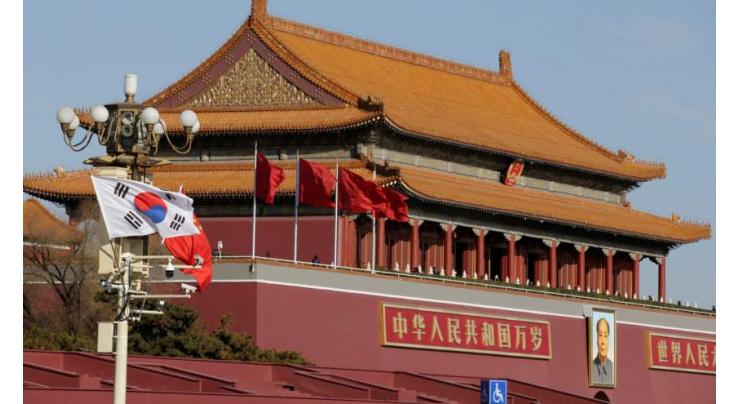
Tokyo To Only Benefit China, N. Korea By Axing Intelligence Sharing Pact - Pentagon
Umer Jamshaid Published November 15, 2019 | 02:57 PM

US Defense Secretary Mark Esper warned on Friday that the looming termination of the intelligence sharing pact between South Korea and Japan would only play into the hands of Beijing and Pyongyang, urging the regional allies to resolve their differences and save the deal
Seoul, (UrduPoint News / Sputnik - 15th November, 2019) US Defense Secretary Mark Esper warned on Friday that the looming termination of the intelligence sharing pact between South Korea and Japan would only play into the hands of Beijing and Pyongyang, urging the regional allies to resolve their differences and save the deal.
Earlier in the day, Esper held the annual Security Consultative Meeting with his South Korean counterpart, Jeong Kyeong-doo, in Seoul. The talks come as the intelligence sharing pact between Japan and South Korea is set to expire on November 23 after Seoul refused to extend it amid the widening trade row.
"The only ones who will benefit from expiration of GSOMIA [General Security of Military Information Agreement] and continued friction between Seoul and Tokyo are Pyongyang and Beijing. That reason alone should be powerful enough for us to sit down and make sure we restore our alliance to where it was so we can work together to respond to our common threats and challenges," Esper said after the talks, as quoted by the Yonhap news agency.
Tensions between Seoul and Tokyo deepened in summer over the issue of compensation for the use of forced labor by Japan during World War II. The rift has since expanded to mutual trade restrictions and even defense cooperation, with South Korea refusing to extend the intelligence sharing agreement with Japan in August.
At the press conference, Esper was also asked whether the US and South Korea planned to go ahead with their traditional drills scheduled for December, which were suspended last year over Pyongyang's complaints.
The Pentagon chief declined to give a direct answer, noting that the armed forces should not only "buttress our diplomacy" but also "enable and empower it."
"[We should] remain flexible in terms of how we support our diplomats to ensure that we do not close any doors that may allow for the progress on the diplomatic front," he said.
In October, Pyongyang gave Washington until the end of the year to come up with a mutually acceptable deal to advance in the denuclearization process.
Related Topics
Recent Stories

Rock-solid Ruud racks up season-leading win in Barcelona

At UN, Iran says it will make Israel 'regret' reprisals

G7 hears calls for 'critical' Ukraine aid

EU seeks to leverage might to confront China, US challenge

5 Customs officials martyred as their vehicle ambushed by terrorists in D I Khan

Pak-New Zealand match called off due to rain

NHA restores traffic on roads affected by recent rains in Balochistan

China to fully support Pakistan's efforts against terrorism: Ambassador Jiang

U.S. envoy calls on Foreign Minister Ishaq Dar

Poland arrests man over suspected plan to kill Zelensky

EU wants to ease youth movement to and from UK

Police foils attempt of supply mainpuri raw material
More Stories From World
-
At G7, Blinken seeks European support for pressure on China
6 hours ago -
Thousands of Bosnian Serbs rally against UN resolution on Srebrenica
6 hours ago -
Israel assault has turned Gaza into 'humanitarian hellscape': UN
6 hours ago -
Husband of ex-Scottish leader charged over alleged embezzlement: police
6 hours ago -
Ecuador hit by power cuts of up to 13 hours amid drought
7 hours ago -
Hugs or bullets? How Mexico presidential rivals aim to curb violence
7 hours ago
-
Kenya military chopper crash kills defence chief, senior officers
7 hours ago -
Biden hails 'incredible' Kennedy family backing against RFK Jr.
8 hours ago -
Maldives court frees jailed ex-president ahead of vote
8 hours ago -
Probe into Portugal ex-PM Costa appears to collapse
8 hours ago -
Jury selection stalls in Trump criminal trial
8 hours ago -

At UN, Iran says it will make Israel 'regret' reprisals
8 hours ago
